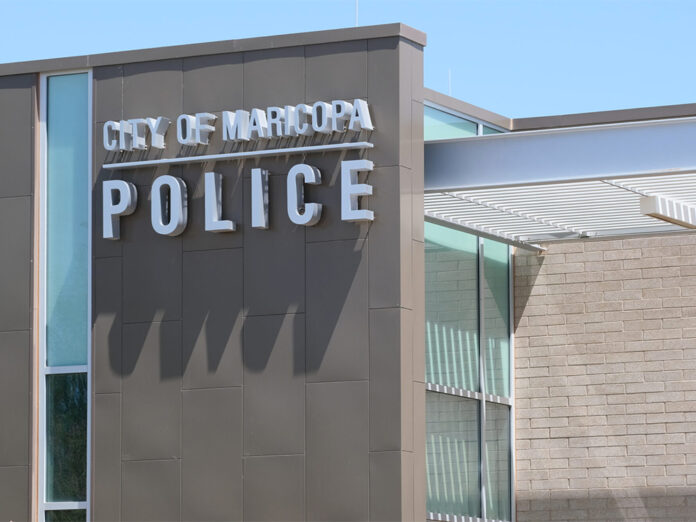
The City of Maricopa may close its in-town Emergency Communication Center and contract with the City of Chandler to handle 9-1-1 calls and police and fire dispatch.
City Manager Rick Horst is evaluating the potential cost-saving move.
But the president of the Maricopa Fraternal Order of Police Lodge #78 is objecting to an outside agency possibly replacing the city communication center.
“Simply put, the members of Lodge 78 stand absolutely opposed to this closure,” Curry wrote in an April 23 letter to Mayor Christian Price and the city. “We believe closing the ECC would be short-sighted ‘pennywise and pound foolish’ and – most importantly – that it will absolutely reduce public safety effectiveness in the City of Maricopa.”
In lieu of the city addressing FOP concerns, Curry said he and the group were preparing “for making our case directly to the taxpaying public.”
In a May 4 response to Curry, Horst countered, saying “It is my belief that we would be ‘pennywise and pound foolish’ not to evaluate system operations on a regular basis. In fact, that is a significant part of my job responsibilities.”
According to Curry’s letter, in 2019, the last year for which complete data is available, the city’s ECC dispatched more than 67,000 calls, including 16,155 emergency calls, an increase of 14 percent from 2018. Dispatchers handled 186 calls per day, about a call about every eight minutes. More urgently, Curry wrote, the dispatchers handled an average of 44 emergency calls per day, or one every 33 minutes.
“From a public safety perspective, it’s clear that the ECC is an entity that works – and works well – to keep the residents of Maricopa and our police officers safe,” noted Curry, a patrol officer with MPD.
He added that he realizes the need to save money when possible but believes the infusion of federal stimulus funding could be used to cover the cost of the city communication center if necessary.
On April 20, city council approved Horst’s recommendation to use the $12.44 million of stimulus funding awarded this year to improve roads and traffic in town, primarily on and around State Route 347.
In his response, Horst listed several reasons why Chandler would make a viable partner for such a venture, including:
- Chandler is a progressive agency leading the way in the state with the latest technology and capabilities of a real-time ECC which offers the potential to increase the effectiveness of the police department and improve resident and officer safety.
- Chandler would have a dedicated channel for MPD to ensure there is no delay in dispatching calls or officer safety communications.
- Chandler currently serves as Maricopa’s backup, and both are part of the Regional Wireless Cooperative, while other nearby jurisdictions like Casa Grande and Pinal County are not. Both Maricopa and Chandler contract with Phoenix Fire to dispatch fire calls, while other nearby jurisdictions do not.
Finally, Horst said, the state is conducting its own study regarding local Public Safety Access Points (PSAP) and is expected to recommend and/or mandate consolidations to provide for sufficient funding, enhanced service capabilities and greater interoperability.
The city’s evaluation of a partnership with Chandler would seek to answer whether a contract with Chandler is financially feasible and sustainable for the long term, and if so, would also identify potential customer service and logistics issues.
In closing his letter, Curry quotes from the city’s 2021 budget book two of the city’s foundational principles. The first is that “Maricopa will continue to be an economically prosperous, dynamic and sustainable community offering government structure that is welcoming and supportive of business and employment growth.”
The second states that “Maricopa will provide a safe and livable community in which citizen involvement supports and upholds the value of being safe and secure in one’s community.”
Horst’s letter invited Curry and the FOP to participate in the evaluation process rather than criticizing it from afar.
“I appreciate the FOP interest in this matter and would encourage you to participate in this process,” Horst wrote. “While your letter expressed concern and an ultimatum, it did not contain data to support your position. We encourage you to take the time, ask the hard questions, and do the research to understand if our practices are the best in the business.”

![MHS G.O.A.T. a ‘rookie sleeper’ in NFL draft Arizona Wildcats wide receiver Jacob Cowing speaks to the press after a practice Aug. 11, 2023. [Bryan Mordt]](https://www.inmaricopa.com/wp-content/uploads/2024/04/cowing-overlay-3-218x150.png)




![Maricopa’s ‘TikTok Rizz Party,’ explained One of several flyers for a "TikTok rizz party" is taped to a door in the Maricopa Business Center along Honeycutt Road on April 23, 2024. [Monica D. Spencer]](https://www.inmaricopa.com/wp-content/uploads/2024/04/spencer-042324-tiktok-rizz-party-flyer-web-218x150.jpg)





![Alleged car thief released without charges Phoenix police stop a stolen vehicle on April 20, 2024. [Facebook]](https://www.inmaricopa.com/wp-content/uploads/2024/04/IMG_5040-218x150.jpg)

![MHS G.O.A.T. a ‘rookie sleeper’ in NFL draft Arizona Wildcats wide receiver Jacob Cowing speaks to the press after a practice Aug. 11, 2023. [Bryan Mordt]](https://www.inmaricopa.com/wp-content/uploads/2024/04/cowing-overlay-3-100x70.png)


